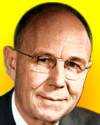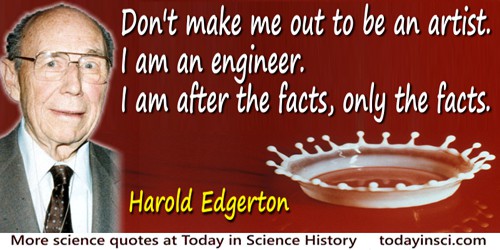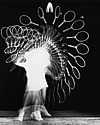 (source)
(source)
|
Harold E. Edgerton
(6 Apr 1903 - 4 Jan 1990)
American engineer and ultra-high-speed photographer known for freezing time by developing ultra-high-speed photography using a strobe light, to make visible that which happened too fast for the eye to see.
|
Harold E. Edgerton
“Don't make me out to be an artist. I am an engineer.”
Illustrated Quote - Medium (500 x 250 px)
More Harold E. Edgerton quotes on science >>
This quote is found in several books about the work of high-speed photography pioneer, Harold Edgeton. In each case it shows how Edgerton always asserted himself as a scientist. Nevertheless, the art world also admired his “consistently compelling body of work”1 comprising some of the “most remarkable time-motion photographs ever made.”2 This is not surprising, for his facts had a beauty, just as 19th century mathematicians could admire the beauty in an elegant formula.
Edgerton spent his entire career at the Massachusetts Institute of Technology. Having invented ultra high flash speeds in the range of one millionth of a second, his multiple-exposure photographs could freeze motion with short stroboscopic bursts of intense light, and reveal the details of motion far beyond the capability of the human eye to detect. When he calculated the speed at which a crack spread through plate glass, it was nearly a mile a second!3
2 Joseph Meehan, Capturing Time & Motion: The Dynamic Language of Digital Photography (2009), 33.
3 Nancy A. Anderson, Michael R. Dietric,The Educated Eye: Visual Culture and Pedagogy in the Life Sciences (2012), 196. The footnote cites Harold E. Edgerton and Kenneth J. Germeshausen, 'The Mercury Arc as an Actinic Stroboscopic Light Source', Review of Scientific Instruments (1932), 3, 535-542; F.E. Bastow and Harold E. Edgerton, 'Glass Fracture Velocity', Journal of the American Ceramics Society (1939), 22, 302-307.
- Science Quotes by Harold E. Edgerton.
- 6 Apr - short biography, births, deaths and events on date of Edgerton's birth.
- Harold E. Edgerton - context of quote “Don't make me out to be an artist. I am an engineer.” - Large image (800 x 400 px)
- How Harold Edgerton made visible what was too fast to see - Video (2016, 5 min).
- Stopping Time: The Photographs of Harold Edgerton, by Gus Kayafas, Estelle Jussim. - book suggestion.






